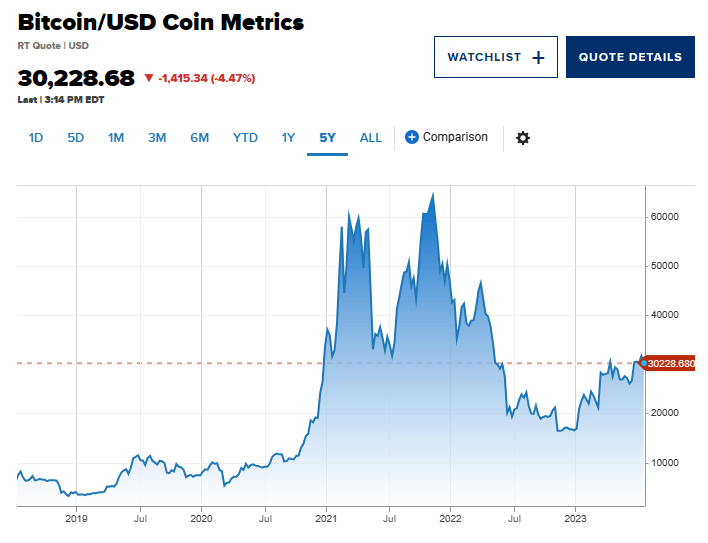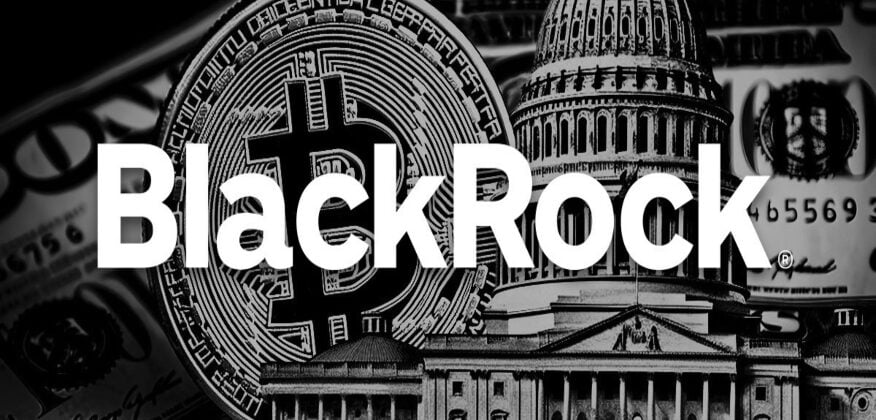We are immersed in what the crypto faithful refer to as a “crypto winter,” where demand and desire for the product and the industry are ice cold.
When the modern day tulip bulb frenzy was at its peak in the fall of 2021, Bitcoin was trading above $60,000 with the talk of $1 million not far into the future. Alas, the million dollar valuation and extraordinary multiples will have to wait.
As you can see from the data, multiple year lows were hit at the end of 2022, which ushered in the crypto winter we speak of.

Those purists who dipped their toes in the water at just above $15,000 a Bitcoin have been rewarded in short order, almost doubling their investment in a six month period. However, most Bitcoiners are HODLers, or long term holders, holding out for not mere 2x or 3x returns, but life changing 25 times their investment.
Now enter BlackRock. The world’s largest asset manager with some $8 trillion under management could be just the monolith and lifeline that crypto needs and potentially a windfall for early investors.
Sentiment among traders has been high after BlackRock CEO Larry Fink gave Bitcoin perhaps its biggest ever endorsement from a major institutional player.
Speaking on Fox Business News this week, Fink called Bitcoin “an international asset” and said it’s “not based on any one currency so it can represent an asset that people can play as an alternative.”
It’s really all about Bitcoin gaining institutional acceptance, which the FTX debacle set back quite a bit, but now with the advent of a possible BlackRock ETF the door has opened again. BlackRock’s submission of an S-1 with the SEC marks a significant development in the Bitcoin investment landscape.
Although not an ETF in name, BlackRock’s iShares Bitcoin Trust application bears striking resemblance to an ETF in function by allowing for daily subscriptions and redemptions, distinguishing it from existing Bitcoin investment vehicles like Grayscale Bitcoin Trust (GBTC).
BlackRock is not the only Bitcoin ETF proposal in town. However, what makes it unique is that it would be the first to gain SEC approval as a Bitcoin spot based trust.
A number of hopefuls have filed proposals in the U.S. for an exchange-traded fund that would offer exposure to Bitcoin, however to date, the SEC has rejected every application for a spot market Bitcoin ETF since the first such filing in 2013.
Advocates for a Bitcoin ETF argue that the complexities of exchanges, crypto wallets, and private keys still present a daunting barrier to entry into the crypto space for newcomers. A Bitcoin ETF would enable these investors to gain exposure to Bitcoin without actually having to hold their own cryptocurrency.
Again, the key differential this time around with BlackRock is how the ETF is structured. Unlike Grayscale and others, which utilize futures contracts for exposure to the Bitcoin space, ETF’s like BlackRock’s offer direct exposure to Bitcoin as the underlying security.
So this is perhaps the real deal for investors looking to diversify into Bitcoin.
BlackRock has a stellar record of approval working with the SEC, where it has been granted all of its 576 applications, except for one, according to Bloomberg Analytics. BlackRock’s ETF filing was praised by former Barclays CEO Bob Diamond. It also inspired WisdomTree, Invesco and Valkyrie to make fresh applications to the SEC while helping to lift Bitcoin’s price back above $30,000 currently.
A spot Bitcoin ETF would clearly be a simple way for institutional investors, like U.S. retirement funds, to gain exposure to Bitcoin’s upside, and it’s very possible that an approved ETF in the U.S. would drive significant price appreciation in the years that follow.
Crypto purists would argue that while furthering the case for Bitcoin, the BlackRock ETF would do little to advance the cause of decentralized finance, to empower the unbanked and revolutionize how people interact with money on a global scale.
Approval of the BlackRock Bitcoin ETF will likely come down to whether the SEC believes that the new security will be free of price manipulation. Potential manipulation of the price of spot Bitcoin is a big reason why the SEC has rejected Bitcoin ETF applications so far.
Currently, the surveillance of ETF’s based upon the underlying futures contract are under the watchful eyes of the Chicago Mercantile Exchange (CME). Listing applications for ETF’s have all argued that the Bitcoin spot market already has surveillance abilities in the form of the CME and its Bitcoin futures. The SEC is still suspect of the correlation of the futures and the spot market, and still feel that the spot market is not regulated sufficiently.
BlackRock’s application has at least one notable addition, an expected agreement to share surveillance of a spot Bitcoin trading platform with NASDAQ, which would list the ETF. We’re currently waiting on the SEC to decide whether this will suffice.
It looks as though the writing is on the wall to receive this new Bitcoin security and open the doors once again for the institutions who will provide this to their constituents. People are intrigued by Bitcoin and its staying power. Many financial advisors are suggesting that individuals allocate between one and three percent of their overall portfolio to Bitcoin.
What you are still not seeing though is acceptance of crypto in general, such as decentralized finance and alt-coins, for example. Like the dotcom bubble and others before it, most who enter this space will fail. Whether we like it or not, BlackRock is one of the U.S. financial institutions deemed too big to fail, regardless of its foray into Bitcoin.











